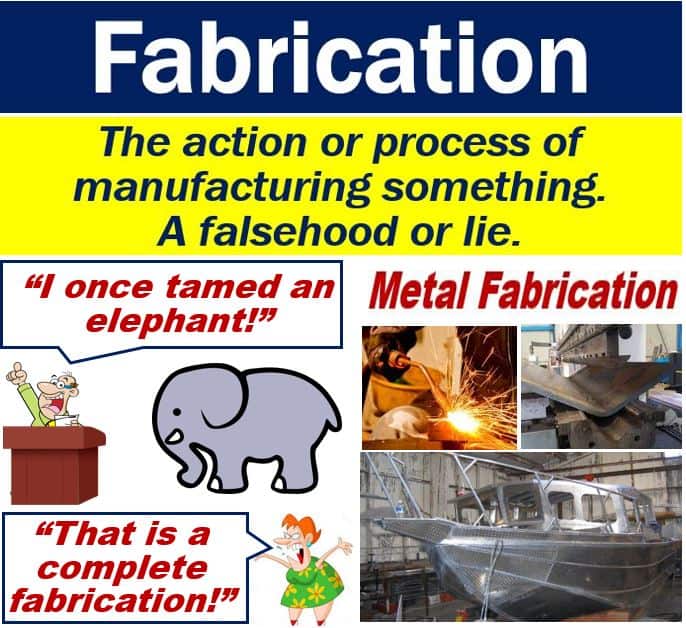What is fabrication? Definition and examples
Fabrication is the process of making something from semi-finished or raw materials rather than from ready-made components. In other words, it is the process of making something from scratch rather than assembling something.
Fabrication skills are increasingly essential in various industries, as they allow for the customization of products to meet specific consumer demands.
“A fabrication” may mean a lie
The term also means a lie. For example, if I say “John’s story about the elephant was a fabrication,” I mean that it was a lie.
We use the term in scientific inquiry and academic research. In this context, fabrication means the deliberate misrepresentation of research results by inventing facts, i.e., making up data.
In some jurisdictions, i.e., legal systems, the deliberate misrepresentation of research data is against the law.
The Cambridge Dictionary has the following definition of fabrication:
“1. The act of producing a product, especially in an industrial process. 2. The act of inventing false information in order to deceive someone, or the false information itself.”
Advanced fabrication techniques, such as additive manufacturing, have revolutionized the industry by allowing for more complex designs and rapid prototyping.

Metal fabrication
Metal fabrication refers to the building of metal structures by assembling, bending, and cutting processes.
It is a value-added process that involves creating machines, parts, and structures from raw materials. A value-added process is one that adds value to a product and for which customers are willing to pay.
Fab shops bid on jobs, which are usually based on engineering drawings. If they win the contract, it means they build the product.
These fab shops offer additional value to customers because they save money. For example, they do not need to use lots of employees to find vendors of different services.
According to Wikipedia:
“Metal fabrication jobs usually start with shop drawings including precise measurements, then move to the fabrication stage and finally to the installation of the final project.”
Etymology of fabrication
Etymology is the study of where words came from, i.e., their origins. The study also includes finding out how the meanings of words have changed.
The term with the meaning “manufacturing, construction” emerged in the English language in the fifteenth century. According to etymonline.com, the term came from the Middle French word Fabrication.
The Middle French word came from the Latin word Fabricationem (nominative fabricatio), meaning “a structure, construction, a making.”
It was not until 1790 that it also meant “lying, forgery, falsehood.”
Key phrases in the world of “Fabrication”
The word ‘fabrication’ weaves into many compound phrases that describe the diverse aspects of creating and manufacturing. Let’s have a look at some of them:
-
Fabrication Techniques
Methods used to create objects from various materials.
Example: “Modern fabrication techniques have enabled the creation of intricate designs in metalwork.”
-
Fabrication Plant
A factory where goods are produced from raw materials.
Example: “The new fabrication plant specializes in aerospace components.”
-
Fabrication Process
The series of operations to form a finished product from raw or semi-finished materials.
Example: “The sculpture went through an extensive fabrication process before it was completed.”
-
Fabrication Cost
The total expense incurred from producing a product.
Example: “The fabrication cost for custom furniture can vary greatly depending on the materials used.”
-
Fabrication Workshop
A workspace equipped for building and assembling materials.
Example: “She spent hours in the fabrication workshop perfecting her design prototype.”
“Fabrication” from root word “fabricate”
The word “fabrication” comes from “fabricate.” Here are more words like it, what they mean, and how to use them:
-
Fabricate (verb)
To make or create, often by assembling parts; in some contexts, it means to invent something false.
Example: “The craftsman was able to fabricate a beautiful piece of jewelry.”
-
Fabrication (noun)
The act or process of fabricating; in some contexts, it refers to a lie or falsehood.
Example: “The bridge’s design required precise fabrication techniques.”
-
Fabricator (noun)
A person or company that fabricates a product.
Example: “She worked as a metal fabricator for an engineering company.”
-
Fabricationist (noun)
A person who invents or concocts things, especially falsehoods.
Example: “The story was the work of a skilled fabricationist.”
-
Fabricated (adjective)
Constructed or manufactured; in some contexts, it refers to something that is made up or false.
Example: “The evidence was completely fabricated.”
-
Fabricating (adjective)
Pertaining to the process of creating or assembling something.
Example: “He was in charge of the fabricating department at the plant.”
-
Fabricative (adjective)
Able or likely to fabricate.
Example: “The fabricative skill of the artist was well-known across the city.”
-
Unfabricated (adjective)
Not fabricated; genuine or authentic.
Example: “The document was unfabricated, containing original signatures.”
-
Nonfabricated (adjective)
Not manufactured or made up.
Example: “The nonfabricated materials ensured the integrity of the building’s structure.”
-
Fabricational (adjective)
Relating to the process of fabricating or manufacturing.
Example: “Fabricational errors in the assembly line were corrected to improve quality.”
Video – What is Fabrication?
This video presentation, from our sister channel on YouTube – Marketing Business Network, explains what ‘Fabrication’ means using simple and easy-to-understand language and examples.

